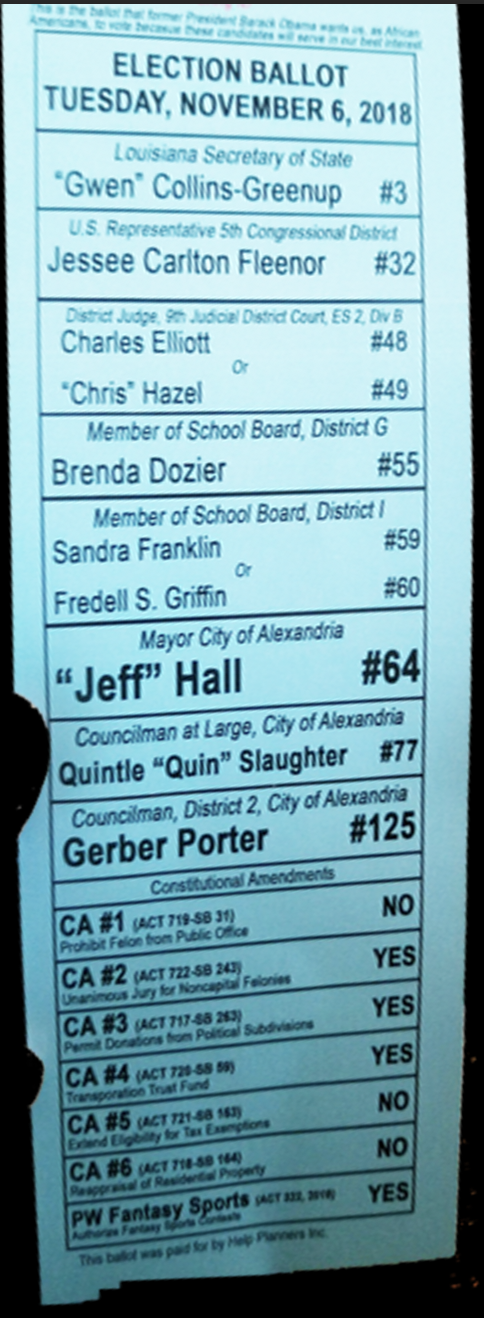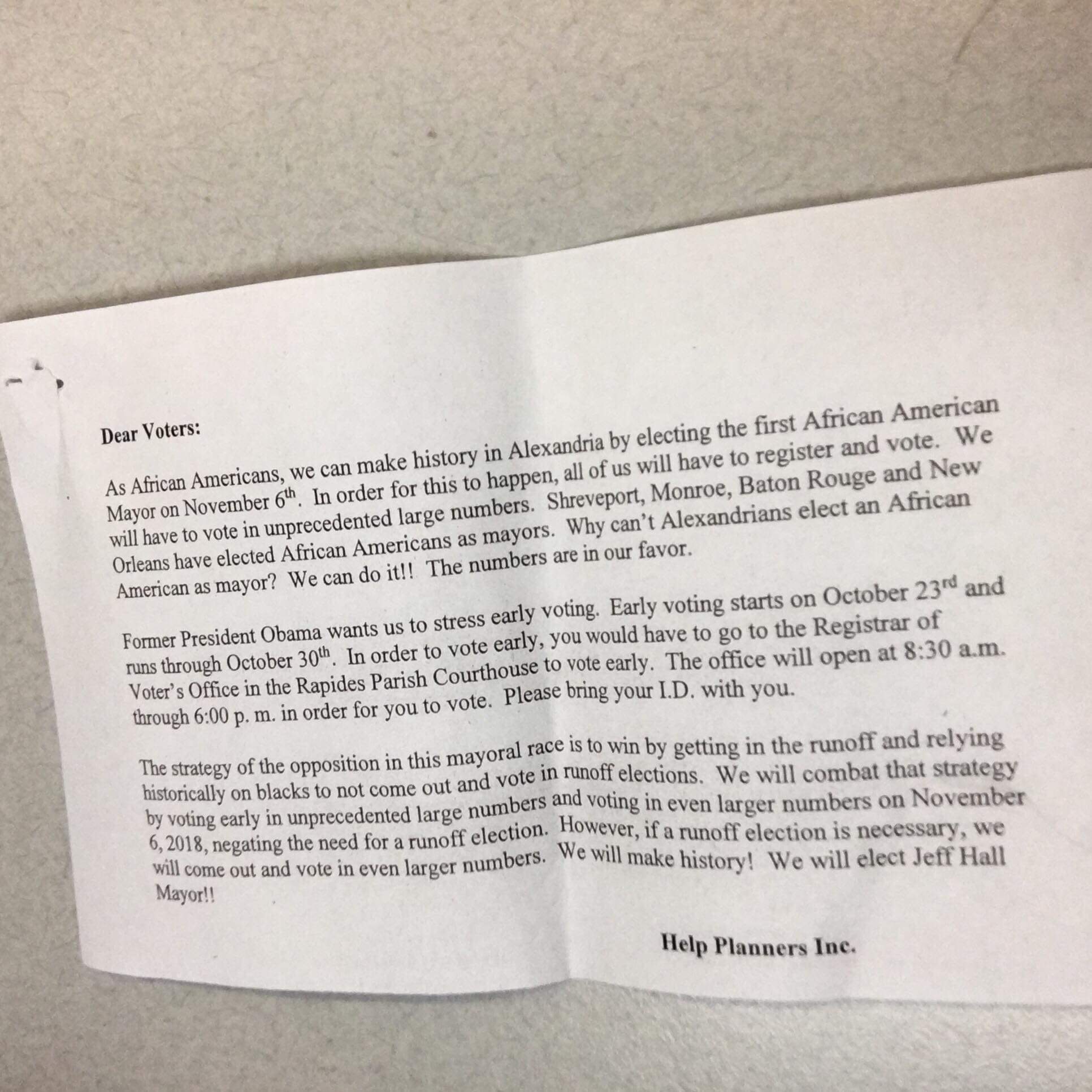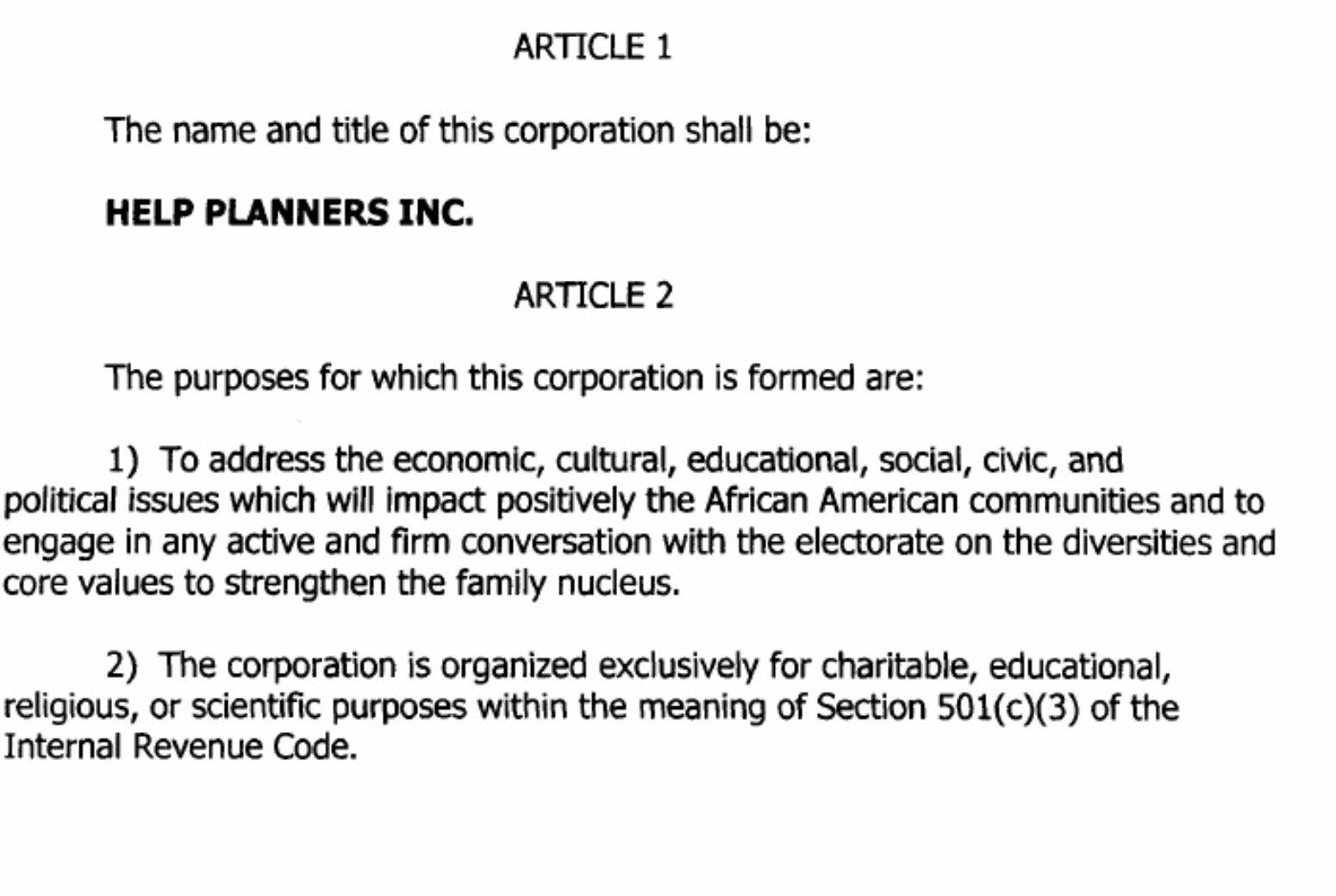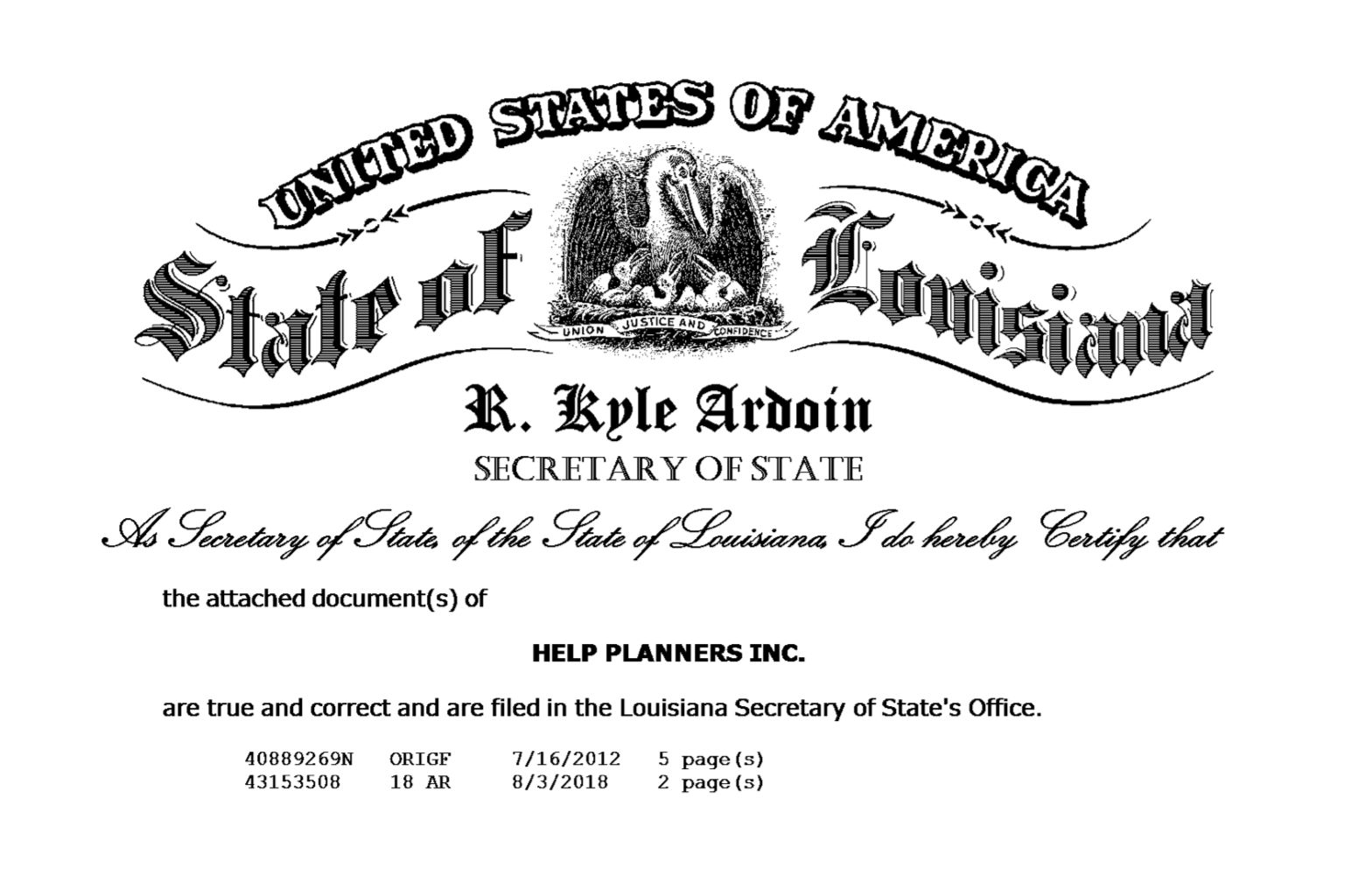A rendering of former President Barack Obama and Louisiana attorney Edward Larvadain, Jr. Artwork by The Bayou Brief, 2018.

Six years ago, on July 13, 2012, long-time attorney Edward Larvadain, Jr. and his wife, both of Alexandria, established a new organization with the banal name Help Planners Inc. It may sound like a financial planning company or a service that helps customers organize their homes, but Help Planners, Inc. is actually a nonprofit corporation. Edward Jr. and his two sons Malcolm and namesake Edward III are all prominent attorneys in Alexandria. The elder Larvadain, slowed down his practice, after a successful career for nearly 53 years, and the nonprofit organization he founded, at least on paper, appeared to provide an opportunity for him to dedicate his twilight years performing important charitable work for his community.
Larvadain named nine others to join Help Planners as board members, and in their articles of incorporation, they articulate their vision for the organization: strengthening and empowering the African American community and helping to keep families together. On paper, at least, there appeared to be nothing unordinary about the nonprofit, which is organized as a 501(c)(3).
However, there is scant evidence that Help Planners Inc. has ever done any type of charitable educational and social welfare work, particularly the type they are required to do in order to maintain their status as a tax-exempt, tax-deductible 501(c)(3).
This year, in the run-up to the midterm elections, Help Planners, Inc. has made their presence known, and their activities should call into question a number of serious legal, campaign finance, and ethical violations.
The organization is now distributing a sample ballot, specifically endorsing candidates, a direct violation of the laws regulating the activities of 501(c)(3) nonprofit organizations. Activities such as these are expressly prohibited, and they demand further investigation into the nonprofit’s prior activities. For years, the group had been rumored to have been behind a series of smear campaigns against candidates for office, including a particularly vicious and cruel rumor about a local elected official’s young family.

Despite their obligation to do so, the organization has never filed a single 990 report with the Internal Revenue Service, according to publicly available records. This ensures that- for the past six years- the organization under Larvadain, Jr.’s control has never disclosed a single donor or expenditure.
Their decision to publish a sample ballot this year, though, will almost certainly ensure that the political activities of Larvadain and his board members, under the pretense of operating a charity, will be forced to file something.
Just as egregiously and in a sign of enormous disrespect, the organization’s sample ballot is prefaced with statement falsely attributed to former President Barack Obama.
Also incredibly, one of the candidates endorsed by the organization, Gerber Porter, is a board member of the nonprofit, which means that, as a fiduciary, he has apparently agreed or at least permitted for the resources of a 501(c)(3) to be used, in part, to help bolster his own campaign.
The ballot was attached to this cover letter:

On a personal note, I studied nonprofit law in law school and have spent the past dozen years researching and writing about campaign finance law. I have never encountered a more brazen example of what should be precisely prohibited than what the Larvadain family nonprofit organization is apparently doing.
For those interested, I tried to make things somewhat easier. Here is everything they’ve filed with the Secretary of State. (No surprise, they’ve haven’t reported anything on campaign finance reports).

Update and clarification: The Internal Revenue Service does not list Help Planners Inc. as a federally registered nonprofit organization, and, as previously stated, a comprehensive search reveals the organization has never filed any documentation or reports with the IRS.
According to other nonprofit law experts, the corporation would therefore be considered a Louisiana nonprofit and would not qualify for the exemptions and deductions otherwise guaranteed under federal law. If, in fact, Help Planners Inc. failed or elected not to avail itself to federal protections, it would not be considered a 501(c)(3).
However, its activities are still governed and constrained by Louisiana state law, and the false assertions that former President Barack Obama both assisted in creating this ballot and endorses the candidates listed on the ballot appear to be in direct violation of La. R.S. 51:1905, which states, in full (emphasis added):
Prohibited acts (of charitable organizations):
A. It shall be unlawful for any charitable organization, solicitor therefor, or person owning, managing, directing, representing, or acting as agent for any charitable organization, an organization soliciting contributions for any charitable organization, or an organization claiming to sell merchandise, products, goods, or services for charitable purposes to engage in unfair methods of competition, unfair or deceptive practices, or misrepresentation.
B. Prohibited acts include, but are not limited to:
(1) False claims that an organization is charitable, nonprofit, or tax exempt.
(2) False claims that an organization is composed of other named or unnamed charitable organizations.
(3) Unauthorized use of the names and implied endorsements of bona fide charitable organizations in the absence of written, notarized authorizations dated less than six months prior to the date the solicitation or sale is made.
(4) False claims concerning the number or membership characteristics of members within the charitable organization.
(5) False claims of the contributions made to other bona fide charitable organizations.
(6) False claims made concerning the date, location, number of participants or attendees, or nature of staged charitable events.
(7) False claims concerning the number of employees or solicitors paid by an organization, the salaries and expenses paid to its staff, management or directors, or the percentage of administrative costs involved in any fund raising activity.
(8) Use of false or fictitious names or addresses for a charitable organization or use of false, fictitious names or aliases by any solicitor, employee, representative, agent, or management official.
(9) False claims that merchandise, products, goods, or services are made by, provided by, or sold on behalf of a charitable organization.
(10) False claims that the profits from sales of merchandise, products, goods, or services are predesignated as contributions to a charitable organization.
In addition, the sample ballot, which includes an endorsement for a board member of the nonprofit organization, also appears to be in violation of La. R.S. 18:1463, which clarifies prohibitions on certain types of political materials. Again, quoting in full (emphasis added):
Political material; ethics; prohibitions
A. The Legislature of Louisiana finds that the state has a compelling interest in taking every necessary step to assure that all elections are held in a fair and ethical manner and finds that an election cannot be held in a fair and ethical manner when any candidate or other person is allowed to print or distribute any material which falsely alleges that a candidate is supported by or affiliated with another candidate, group of candidates, or other person, or a political faction, or to publish statements that make scurrilous, false, or irresponsible adverse comments about a candidate or a proposition. The legislature further finds that the state has a compelling interest to protect the electoral process and that the people have an interest in knowing the identity of each candidate whose number appears on a sample ballot in order to be fully informed and to exercise their right to vote for a candidate of their choice. The legislature further finds that it is essential to the protection of the electoral process that the people be able to know who is responsible for publications in order to more properly evaluate the statements contained in them and to informatively exercise their right to vote. The legislature further finds that it is essential to the protection of the electoral process to prohibit misrepresentation that a person, committee, or organization speaks, writes, or acts on behalf of a candidate, political committee, or political party, or an agent or employee thereof.
B.(1) No person shall cause to be printed or assist in the distribution, transportation, or transmission by any means of any facsimile of an official ballot or cause to be printed, distributed, transported, or transmitted any unofficial sample ballot with the number of a candidate unless the name of the candidate to whom the ballot number was assigned is correctly listed on the ballot.
(2) No person shall cause to be printed or assist in the distribution, transportation, or transmission by any means of any facsimile of an official ballot, or cause to be printed, distributed, transported, or transmitted any unofficial sample ballot containing a photograph, or likeness of any person which falsely alleges, with an intent to misrepresent, that any person or candidate, or group of candidates in an election is endorsed by or supported by another candidate, group of candidates or other person.
C. (1) No person shall cause to be distributed, or transmitted, any oral, visual, or written material containing any statement which he knows or should be reasonably expected to know makes a false statement about a candidate for election in a primary or general election or about a proposition to be submitted to the voters.
(2) Whenever any person, political committee, entity or organization makes a disbursement for the purpose of the financing of any electioneering communication, such communication shall comply with the following items under the following circumstances:
(a) If the communication is paid for and authorized by a candidate, an authorized political committee of a candidate, or its agents, it shall clearly state that the communication has been paid for by such authorized political committee. The name of the political committee paying for the communication shall be given in full and no acronyms shall be used.
(b) If the communication is paid for by other persons, but authorized by a candidate, an authorized political committee of a candidate, or its agents, it shall clearly state that the communication is paid for by such other persons and authorized by such authorized political committee. The name of the authorized political committee shall be given in full and no acronyms shall be used.
(c) If the communication is not authorized by a candidate, a political committee of a candidate, or its agents, it shall clearly state the (i) name, (ii) physical address (not post office box), and (iii) telephone number and the world-wide web address if available of the person, committee, entity or organization who paid for the communication and state that the communication is not authorized by any candidate or candidate committee. The name of the payer shall be given in full and no acronyms shall be used.
(3) If an individual, association, organization, committee, or corporation is responsible for or causes the distribution or transmission of any statements relative to candidates or propositions which do not fully disclose the name of the individual or the name of the association, organization, committee, or corporation, and the full and correct name and address of its chairman or other chief administrative officer and whether or not such individual, association, organization, committee, or corporation supports or opposes such candidate or proposition, such individual, association, organization, committee, or corporation shall report all expenditures incurred in relation to the publication, distribution, transportation, or transmission in accordance with R.S. 18:1491.7, 1495.5, or 1501.1.
(4)(a) No person shall misrepresent himself or any committee or organization under his control as speaking, writing, or otherwise acting for or on behalf of any candidate, political committee, or political party, or any employee or agent thereof.
(b) No person shall willfully and knowingly participate in or conspire to participate in a plan, scheme, or design to misrepresent himself or any committee or organization under his control or under the control of any other participant in the plan, scheme, or design as speaking, writing, or otherwise acting for or on behalf of any candidate, political committee, or political party, or any employee or agent thereof.
(c) A radio or television broadcaster who broadcasts a paid political announcement or advertisement, the content of which the broadcaster had no input in or control over, is not subject to the provisions of this Paragraph.
(5) For purposes of Paragraph (2) of this Subsection, the term “electioneering communication” means any broadcast, cable, or satellite communication that refers to a legally qualified candidate for elected office and is broadcast within sixty days before any election in which such candidate is on the ballot.
D.(1) An affected candidate or voter shall be entitled to an injunction to restrain future violations of Subsections B and C of this Section.
(2) In the event a permanent injunction is granted, reasonable attorney fees shall be allowed the petitioner by the court which shall be taxed as costs to be paid by the defendant.
E. No person shall cause to be distributed or transmitted for or on behalf of a candidate for political office any oral, visual, or written material constituting a paid political announcement or advertisement, which is paid for by a third-party entity, without providing the name of the third-party entity on the face of the advertisement. The name of the third-party entity shall be included on written material, political announcements, and advertisements so that it is clear and understandable. The name of the third-party entity in visual and oral political announcements or advertisements shall be included so that it is clearly understandable as well as audible and visible for not less than three seconds. If the advertisement is placed by a public relations firm, advertising agency, media buyer, or other person who purchases media advertising or time or space for such advertising, such person shall provide the information required by this Section. For the purposes of this Subsection, “person” means any individual, partnership, association, labor union, political committee, corporation, or other legal entity, including its subsidiaries; however, “person” shall not mean any radio station, television broadcast station, cable television company, or newspaper.
F. Whoever violates any provision of this Section shall be fined not more than two thousand dollars or be imprisoned, with or without hard labor, for not more than two years, or both.

